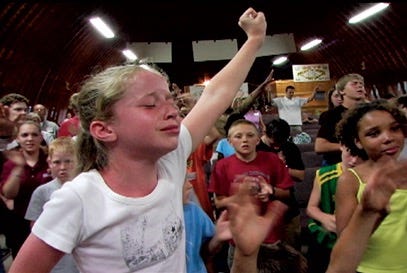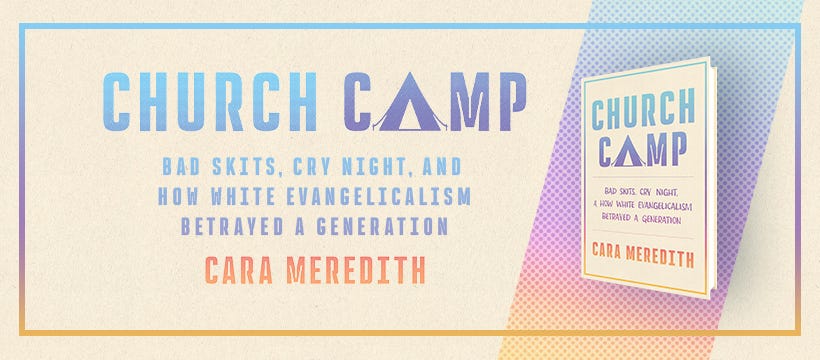What do we mean when we talk about Cry Night?
An answer to this question + an excerpt from the book
Last week, I jumped on a call with Morgan and Sara, the women behind That’s the Spirit podcast. (You can catch the full episode here or wherever you like to listen to podcasts). Sara’s a kindred spirit of a writer friend and the author of Orphaned Believers; Morgan is the kind of human you dream of having beside you in life, her generous, kind spirit evident over the airwaves.
At one point, the pair asked a question that is either overwhelmingly obvious or completely perplexing to the general public: What’s Cry Night?
“Cry Night,” of course, stars in the subtitle of the book—because in the world of white evangelical camping, a night of decision often exists. But it’s a night marked by seriousness and tears, a night of “getting right” with God.
Because conversion is the whole point of camp, an opportunity to convert has to happen at some point along the way. Campers have to say “yes” to Jesus, whether for the first time, the fifth time, or the 100th time in a row—not only to fulfill that end goal of conversion, but also to let camp staff record those numbers (and pass them along to eager donors in turn).1
Take in that last sentence again, if need be.
As I wrote about last week, many of these camps ascribe to a theological formula (or theory) called penal substitutionary atonement, mostly because it works. But when this theory is employed, fear also naturally accompanies the aforementioned decision process. In other words, fear, shame, and punishment become part of the decision process (and also oftentimes part of how humans view God—and themselves—altogether).
And what do fear, shame, and punishment often produce? Tears.
Campers cry, because they feel bad. They cry, because they’re afraid of what might happen if they don’t say yes to God. They cry, yes, because they’re having a heightened emotional and spiritual experience, but this experience is also the very thing that’s applauded by camp staff and celebrated by their peers.
There is so much more I could say on the subject, but for now I’m going to leave you with another short excerpt from Church Camp.
Enjoy, dear reader.
In this scenario, Jesus becomes the superhero who steps in to save humanity from the conundrum of a loving God who has no other choice but to send everyone to hell—who subsequently leaves behind a trail of breadcrumbs that leads to the one campers are supposed to want to “get to” in the first place. Fear prompts them into saying yes: they’re left with no other choice but to accept Jesus, even if they don’t understand, even if they feel pressure to make a decision, even if they don’t actually believe in the triune God.
But isn’t that the point? Within the framework of white evangelicalism, yes, that is the point. If you believe the alternative to accepting the love of God is eternal punishment, lest you eradicate the threat by saying a special prayer and causing the angels to throw a party over you in heaven, then yes, seeing numbers tick up on denominational conversion scales matters more than anything else. But when the breath of fear is everywhere, one has to question whether it makes for an authentic encounter with the God of the universe.
I think of the nearly fifty individuals I interviewed over the course of fifteen months: When prompted with the questions What do you see as problematic or manipulative that you wish you could take back now? What does this make you think about your camp experience in general? nearly every interviewee responded with similar sentiments—and nearly every sentiment involved a memory of this particular night at camp. Some called it Cry Night, while others referred to it as Serious Night; a couple of former charismatics referred to it as Speak in Tongues night, while a lifelong Presbyterian referred to it as Confession Night. Although part of me wonders if subsequent answers came with the territory of asking such a biased (objection, Your Honor, leading) question in the first place, when the experiences of dozens of individuals echo a kindred refrain, you wonder if you’re on to something.
“I killed Jesus!” one interviewee remembered thinking to himself on this particular night at camp. Although Jackson grew up in a Southern Baptist home, Christ became real to him in a new way at Windy Gap, a Young Life camp. “Even though I already knew the story of Jesus, it was like I heard it again for the first time. Afterwards, I lay there on the grass, tears streaming down my face. They poured the emotions and imagery on thick. They took me there. As a thirteen-year-old kid, the only thing I could do was say ‘yes’ because of course I’d say yes: I thought I’d killed Jesus. I had to say ‘yes.’”
Another interviewee recalled the accompanying dread of the evening, both as a camper and as a camp counselor: “We all knew what was coming. And I know this sounds terrible, but I just wanted to get the whole thing over with. We were church kids. They were church kids. All of us already believed, but there we were, making another decision for Christ.” For this person (who wished to remain anonymous) and others like them, it was hard to separate this night from what felt like a curated agenda, which is to say, from the ultimate goal of conversion.
Yet another interviewee, Evelyn, remembered the moment it all changed for her. Decision Night, as she called it, had always been a very moving experience. Her third summer at camp, she recalls opening her eyes at a time when everyone, staff included, was expected to keep their heads bowed and their eyes closed. In this moment, she noticed the camp director counting how many campers raised their hands to make a first-time decision for Jesus and then how many raised their hands to rededicate their lives to Jesus. He jotted those numbers down in a small notebook, which he tucked into the back pocket of his jeans.2
I take a deep-dive into many different facets of this night, including emotionality, groupthink, and a Cry Night story of my ten-year-old self. But also? Like I said last week, I imagine other ways forward, because, dear reader, there are other, better ways forward.
If this post strikes something in you or resonates with you, I urge you to share it with a friend that might need to read it.
But also? Preorder the book: I’d love to see my friend Kathleen at Great Good Place for Books reach 100 preordered copies!3 We’re getting close!
Let’s write a better story, together—
Cara
Also, as noted last week, this is not universal to church camps. This also happens at vacation bible schools, at youth groups, and in the pulpit too.
Church Camp, pages 116-117.
As of Tuesday, we were at 71. Let’s go!





It all seems so programmed - form but no substance. It leaves kids hanging out to dry with little direction. I have a grandson who was traumatized by something similar.
There are better ways forward! SO appreciate you writing about these things.
It's bringing to mind my InterVarsity days - I realized at some point, maybe during my year on staff there, that we counted conversions but not deconversions. We knew students "came to faith" during our conferences or large group meetings but then later decided that wasn't really what they wanted, or they felt they'd been manipulated into it and it wasn't real, etc., but we ignored the latter and only counted (and communicated to donors) the former...